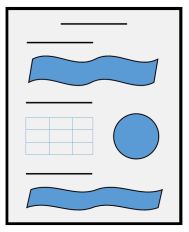Find out what kinds of data we are collecting!
UW EXP study is working with the UW College of Engineering to better understand stressors that students face and investigate ways to support mental wellness for the diverse engineering student body.
Students can experience negative stress from major life events, discrimination, and difficult academic challenges, especially in the capacity-constrained environment of the College of Engineering. This study is unique and valuable because it is one of the first to combine biometric data with self-reported data. It is our hope that by combining the two, we can begin to understand the relationship between behavior, mental health, and student experiences.
We are using survey, phone, and biometric data in a comprehensive approach to understand the changes in and effects of stress in the student experience. This comprehensive and biometric approach is relatively new, and we are adding to a growing body of research that connects changes in mental health to changes in social and physical activity. We hope to better quantify the effects of major life events, mental health issues, and discrimination that students experience, recommend policy changes in the College of Engineering, and suggest positive coping strategies to improve the UW student experience.

AWARE Framework
One tool we use to gather information is a mobile application called AWARE. This app monitors and collects several aspects of students’ phone usage, including:
- WiFi network access
- Bluetooth usage
- Network status
- Location information
- Screen brightness
- Use of other installed applications.
AWARE also tracks the frequency of phone calls and SMS events. This wraparound data collection tool helps us understand how students use their phones. AWARE also links to the Fitbit app on students’ phones and is the portal through which students complete surveys. More information about the AWARE framework can be found here.

Surveys
Another way that participants share information about themselves is by completing surveys throughout the study. At the beginning and end of each quarter, students complete an extensive questionnaire about their demographics, life experiences, and health habits. These help us understand their baseline identities and behaviors before they enter the study, and how those factors may have changed at the end. Then, throughout the quarter, participants complete surveys twice a week using the AWARE app, answering questions such as:
- Rate how these attributes describe you right now on a 1-5 scale: Confident
- Rate how these attributes describe you right now on a 1-5 scale: Anxious
- How many social interactions have you had this week?
- Are you satisfied with the amount of social interaction you have had this week?
This is also where participants are asked if they experienced unfair treatment. This comprehensive survey approach helps us understand changes in students’ well-being throughout the study.
These surveys were created to attempt to capture a holistic view of the student experience, and therefore they include sensitive questions such as habits around alcohol and drug use. We understand that this information could be damaging to participants’ reputations, especially those under the age of 21, if their identities were made public. Because of this, keeping people’s identities separate from their responses and strictly confidential is a high priority in this study. All of the data we work with is anonymized and aggregated and stored securely as it is analyzed to ensure anonymity.

Academic and Peripheral Data
Some participants also chose to share additional peripheral factors about their experience at the University of Washington. These include their:
- Academic record
- Financial aid information
- Facebook profile
These attributes provide different yet important supplemental information. Information on students’ financial aid helps us more accurately stratify students by income in our analyses. Access to participants’ academic record provides a factual basis for us to measure their academic success and can help us measure long-term outcomes of ongoing stress and discrimination.

Fitbit
The last piece of the data portfolio for each participant is biometric data that we obtain through a Fitbit that they wear. For this study, we used the Fitbit Flex 2, a small, waterproof piece of technology that fits into a slim wristband worn by the user. The Fitbit is an optimal tool for our study because participants can wear it throughout the day, as they sleep, through rough use, and through exposure to water. The Fitbit collects and syncs data using Bluetooth and its own mobile application, and we access that data through the AWARE framework. This study looks specifically at:
- Sleeping habits
- Physical activity
By monitoring these physical factors, we hope to obtain a clearer picture of the correlation between mental and physical health, and understand the story of students’ physical health throughout the quarter.

A Tech-Forward Approach
This study informs the University of Washington of the wellness of its student body. On a larger scale, this research will help the broader scientific community better understand the health and academic effects of discrimination and the physical manifestation of mental health issues. We look forward to analyzing this data further to identify and share our findings.

A Tech-Forward Approach
UW EXP uses data from surveys, phones, Fitbits, and more to capture a comprehensive understanding of the UW student experience.
Funding
The UWEXP study is an expensive study to run. Our funders have been crucial to our success. Currently, the study is funded by internally by the College of Engineering (including the Department of Electrical and Computer Engineering and the Allen School of Computer Science and Engineering), Population Health Initiative, and Alcohol and Drug Abuse Institute. In addition, we have funding from the National Science Foundation; Samsung Advanced Institute of Technology; and Google.

Published Works
UW EXP is publishing our findings on how physical activity and sleep duration change when students report events of unfair treatment.
